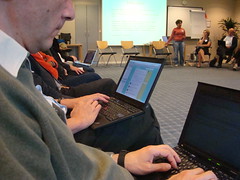 After the key note speech of Lea Santana (NEIM - see also her blip interview), participants in the IMWG 2009 meeting jumped into the peer assist session, to discuss some of the issues they are facing in their daily work.
After the key note speech of Lea Santana (NEIM - see also her blip interview), participants in the IMWG 2009 meeting jumped into the peer assist session, to discuss some of the issues they are facing in their daily work.The group identified a series of specific questions on which to compare notes and exchange views:
1. How do researchers share knowledge and learn form the knowledge that is produced and exists?
Some participants noted that learning has to be part of the research process. In this process, important is also to share lessons of what did not work so to learn form failures. A fundamental question remain: How do you learn to do things different, especially bringing together people that speak different languages (researchers, NGOs, policy makers)?
A good example comes form DIIS, that hosts staff from Foreign Affairs and DANIDA for a period of time. This way researchers learn how to write in a way that is more immediate to grasp for policy makers: concise, to the point, in a way that can be useful and not just good for academic carrier. It works also the other way around, with researchers outplaced to DANIDA and working there.
2. What's the role of intermediaries?
If you want your research being applied, it has to be communicated, it has to be made known to the target group that needs to use it. The way you write and communicate research findings needs to have the format geared to the audience. You need to to know who you talk to in order to decide your language. In this process, you also choose the appropriate tool(s) to reach your target group.
The role of communication professionals is therefore a key one. Researchers generate very specific outputs; therefore you need 'brokers' that translate these outputs in formats that can be used and applied. There needs to be an expert in between researchers and non-researchers. However it's was underlined that these intermediaries have to work with the researchers and not for the researchers. Therefore the dialogue between researchers and intermediaries needs to
 start before the research takes places.
start before the research takes places.Lastly, it was noted that also other professions have trouble in communicating; what can we learn from experiences in other fields to deal with these issues?
3. Copyright issues
More and more organisations are adopting Creative Commons licenses, what are the pros and cons of this?
Creative Commons allows new distribution ways of information and knowledge produced, making sure that other people can use our work. But as with every deal concerning peoples intellectual property, there's some hesitation around in doing that.
A good example comes form Development in Practice which decided to go for a Creative Commons-Attribution-Noncommericial-No Derivatives license, as it was felt that this protects the interest of the author. However, when you want to apply similar licenses, you need to make it clear to the author from the beginning.
Furthermore, the choice of license very much depends also on where you see that your info is potentially useful.
Plagiarism can happen anyway, regardless of the way of publishing and the license you use; others are the checks and balances which are needed.
One of the participants commented that there need to be more debate on commercial vs. non commercial use of content under CC license.
Useful information on this issue can be found on the web dossiers on open access from EADI, ELDIS and Wellcome Trust. See also the blog post from the open space discussion on the issue during the IMWG 2009 meeting.
Other issues briefly touched upon during these peer assist session included:
- The 'long-tail' of research outputs [Some research outputs are peer reviewed and get increased value and recognition only after the research funds are finished: How do donors go about that?]
- How to compile annual reports [strategy and tools] and how to make them 'live' longer that the time span they cover?
See also Euforic newsfeeds on information, knowledge, communication, and from the IMWG 2009 workshop.
